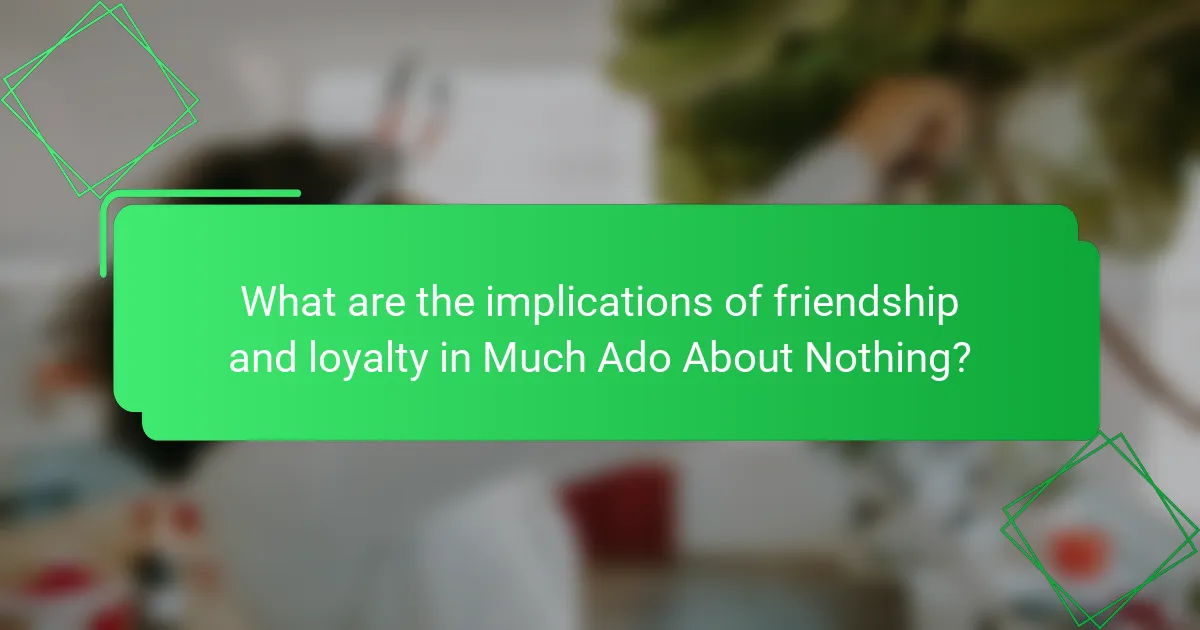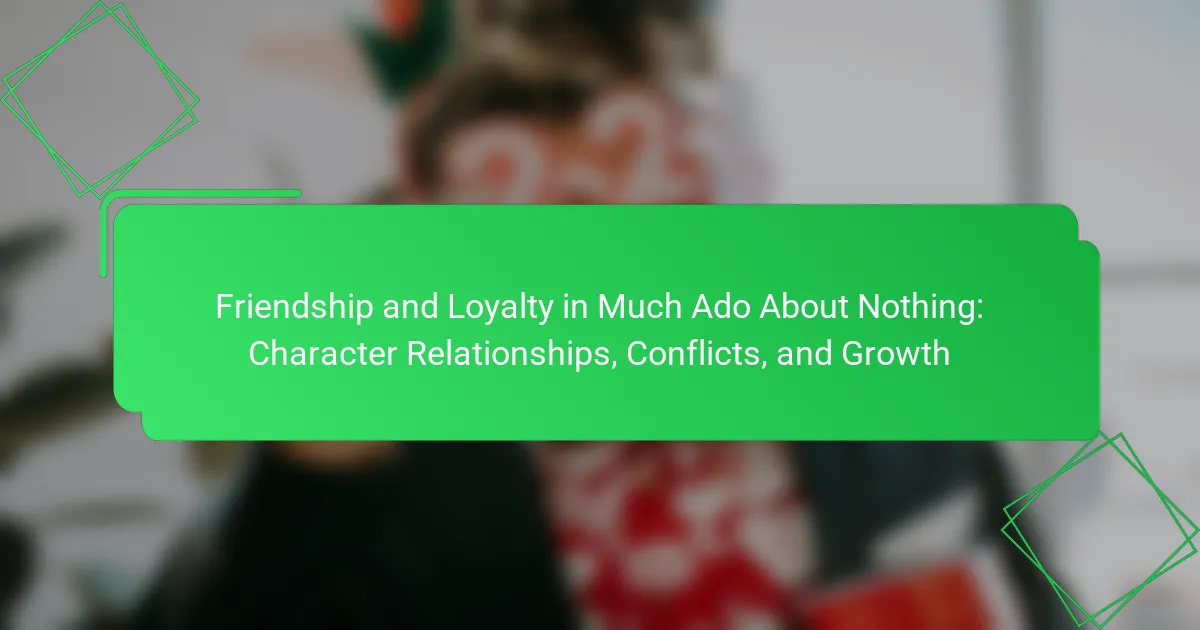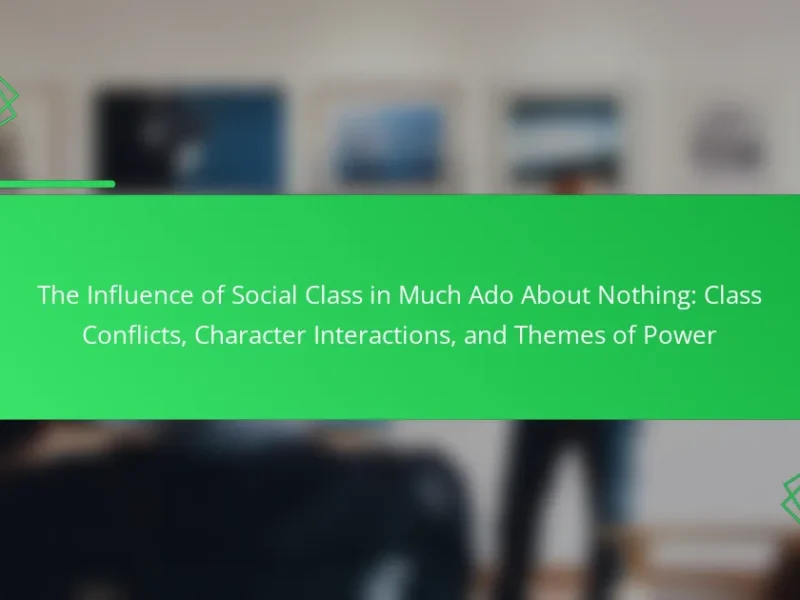
What are the themes of friendship and loyalty in Much Ado About Nothing?
The themes of friendship and loyalty in Much Ado About Nothing are central to the narrative. Friendship is portrayed through the close bonds between characters like Beatrice and Benedick. Their playful banter highlights the strength of their relationship. Loyalty is tested when Claudio publicly shames Hero, revealing the fragility of trust. Despite this betrayal, the loyalty of friends like Beatrice and Ursula helps to restore harmony. Ultimately, the play illustrates how friendship can overcome obstacles and how loyalty is essential for true connections. These themes are woven into the character dynamics and conflicts throughout the story.
How do friendship and loyalty manifest in character relationships?
Friendship and loyalty manifest in character relationships through mutual support and trust. Characters demonstrate these traits by standing by each other during conflicts. For example, in “Much Ado About Nothing,” Benedick and Beatrice showcase loyalty through their witty banter and eventual commitment. Their friendship evolves as they confront societal expectations and personal insecurities. Claudio’s betrayal of Hero highlights the fragility of loyalty, as he quickly doubts her fidelity without seeking the truth. This act strains their relationships, revealing how trust is foundational to friendship. Ultimately, characters like Dogberry emphasize loyalty through their dedication to justice and community. These dynamics illustrate the complexities of friendship and loyalty in shaping character interactions and growth.
What role do friendships play in the development of the plot?
Friendships are crucial in developing the plot of “Much Ado About Nothing.” They create connections between characters that drive the story forward. The bonds of friendship lead to conflicts and misunderstandings, particularly between Beatrice and Benedick. Their relationship evolves through playful banter, showcasing how friendships can influence personal growth. Additionally, the friendship between Claudio and Benedick propels the narrative, as Claudio’s actions impact Benedick’s decisions. The loyalty among friends also highlights themes of trust and betrayal, especially in the case of Don John’s schemes. Ultimately, friendships serve as a catalyst for character development and plot progression throughout the play.
How do loyalty and betrayal affect character dynamics?
Loyalty and betrayal significantly shape character dynamics by influencing relationships and conflicts. Loyalty fosters trust and strengthens bonds among characters. It encourages cooperation and mutual support, as seen in the friendships of Beatrice and Benedick. Betrayal, on the other hand, introduces tension and conflict. It can lead to misunderstandings and emotional turmoil, exemplified by Claudio’s public shaming of Hero. The interplay between loyalty and betrayal creates dramatic tension and propels character development. Characters often face moral dilemmas that test their loyalty. This results in growth or downfall, impacting their relationships with others. In “Much Ado About Nothing,” these themes drive the narrative and highlight the complexities of human connections.
Why are friendship and loyalty important for character growth?
Friendship and loyalty are crucial for character growth as they foster trust and support. These qualities help individuals navigate challenges and develop resilience. In “Much Ado About Nothing,” characters like Benedick and Beatrice grow through their loyal friendships. Their relationships encourage self-reflection and personal development. Loyalty also creates a safe environment for vulnerability. This leads to deeper connections and understanding among characters. Trust built through friendship allows for honest communication. Consequently, characters evolve and mature, learning from their experiences.
How do characters evolve through their friendships?
Characters evolve through their friendships by experiencing personal growth and transformation. Friendships in “Much Ado About Nothing” serve as catalysts for change. For instance, Beatrice and Benedick’s relationship shifts from verbal sparring to mutual respect and love. This evolution highlights their deeper understanding of each other’s vulnerabilities. Claudio’s friendship with Don Pedro leads to both loyalty and betrayal, impacting his perception of love and trust. Additionally, the friendships among the ensemble cast reveal hidden truths and foster reconciliation. Such dynamics illustrate how friendships can challenge characters to confront their flaws and embrace change. Ultimately, these relationships shape their identities and decisions throughout the narrative.
What lessons about loyalty can be drawn from character interactions?
Character interactions in “Much Ado About Nothing” reveal several lessons about loyalty. Loyalty can be tested through misunderstandings and deception. For example, Claudio’s betrayal of Hero demonstrates how easily trust can be undermined. When he publicly shames her, it shows the fragility of loyalty in relationships. Additionally, Beatrice’s unwavering support for Hero highlights the importance of defending loved ones. This loyalty strengthens their bond and ultimately leads to reconciliation. Furthermore, the loyalty displayed by Benedick towards Beatrice illustrates that true loyalty involves standing by someone despite challenges. These interactions emphasize that loyalty requires both trust and active support in the face of adversity.

How do conflicts arise from friendship and loyalty in the play?
Conflicts arise from friendship and loyalty in the play through misunderstandings and betrayal. Characters often face dilemmas between their loyalty to friends and their personal interests. For example, Claudio’s loyalty to Don Pedro leads him to publicly shame Hero. This act stems from misinformation, showcasing how trust can be easily broken. Additionally, Beatrice and Benedick’s relationship reveals tension between friendship and romantic loyalty. Their banter often masks deeper feelings, leading to conflicts over their true loyalties. In essence, the interplay of friendship and loyalty creates a fertile ground for conflicts, driven by miscommunication and societal expectations.
What specific conflicts highlight the themes of friendship and loyalty?
The specific conflicts that highlight the themes of friendship and loyalty in “Much Ado About Nothing” include the misunderstandings between Claudio and Benedick. Claudio’s public shaming of Hero demonstrates betrayal, testing the loyalty of friends. Benedick’s support for Beatrice showcases loyalty amidst conflict. The deception surrounding Hero’s fidelity creates tension among characters. These conflicts drive the narrative, emphasizing the importance of trust and friendship. The resolution of these conflicts ultimately restores loyalty and strengthens relationships.
How do misunderstandings impact friendships among characters?
Misunderstandings can significantly strain friendships among characters. In “Much Ado About Nothing,” misunderstandings lead to conflict and emotional turmoil. For example, Claudio’s misinterpretation of Hero’s fidelity causes him to publicly shame her. This act not only damages their relationship but also affects the bonds among their friends. Benedick and Beatrice experience misunderstandings that create tension in their interactions. Such conflicts reveal insecurities and lead to isolation among characters. Ultimately, misunderstandings serve as catalysts for growth and reconciliation in friendships. They challenge characters to confront their assumptions and communicate more openly.
What moments of betrayal challenge the bonds of loyalty?
Moments of betrayal that challenge the bonds of loyalty in “Much Ado About Nothing” include Claudio’s public shaming of Hero. This act occurs during their wedding ceremony. Claudio believes Don John’s deceitful claims about Hero’s fidelity. As a result, he rejects her, leading to her public humiliation. This betrayal fractures their relationship and affects their friends. Another instance is the manipulation of Benedick and Beatrice. Their friends deceive them into believing the other is in love. This manipulation tests their loyalty and trust in each other. Lastly, Don John’s schemes create discord among friends. His actions ultimately reveal the fragility of loyalty in relationships. These moments highlight how betrayal can deeply impact bonds of friendship and love.
How do characters resolve conflicts related to friendship and loyalty?
Characters resolve conflicts related to friendship and loyalty through open communication and reconciliation. In “Much Ado About Nothing,” misunderstandings create tension among friends. For example, Claudio’s public shaming of Hero stems from misinformation. This conflict is resolved when the truth is revealed, leading to forgiveness. Benedick and Beatrice also navigate their loyalty to each other by confronting their feelings. Their eventual union highlights the importance of honesty in friendships. Additionally, the characters often rely on mutual friends to mediate disputes, reinforcing their bonds. This demonstrates that resolution involves both dialogue and support from the community.
What strategies do characters use to mend broken friendships?
Characters use several strategies to mend broken friendships in “Much Ado About Nothing.” They often employ open communication to express feelings and misunderstandings. For instance, Beatrice and Benedick confront their issues directly. They articulate their emotions, which helps clear up past grievances. Additionally, characters like Claudio seek forgiveness after realizing their mistakes. They acknowledge their wrongdoings and show remorse, which is crucial for reconciliation. Another strategy involves mutual friends facilitating discussions. For example, friends often mediate to help restore trust. These strategies highlight the importance of honesty, accountability, and support in rebuilding relationships.
How does forgiveness play a role in restoring loyalty?
Forgiveness is essential in restoring loyalty within relationships. It allows individuals to overcome past grievances and rebuild trust. When one party forgives another, it creates an opportunity for reconciliation. This act can heal emotional wounds and foster a sense of understanding. In “Much Ado About Nothing,” characters like Claudio and Benedick demonstrate how forgiveness can mend broken bonds. Claudio forgives Hero after realizing his mistake, which ultimately restores their relationship. By forgiving, characters can move past conflicts and reaffirm their loyalty to one another. This process highlights the transformative power of forgiveness in maintaining strong friendships.

What are the implications of friendship and loyalty in Much Ado About Nothing?
Friendship and loyalty in Much Ado About Nothing significantly impact character relationships and conflict resolution. The play illustrates how loyalty strengthens bonds between characters. For example, the loyalty between Benedick and Claudio is tested through misunderstandings and deception. Friendship often leads to alliances, such as when Beatrice and Benedick support each other against societal pressures.
Conversely, disloyalty causes conflict, as seen with Don John’s betrayal. His actions disrupt friendships and create tension among the main characters. The implications of these dynamics highlight the importance of trust in relationships. Ultimately, loyalty fosters growth and reconciliation, as characters learn the value of honesty and support. This theme culminates in the resolution of conflicts, restoring harmony among friends.
How do the outcomes of friendships shape the overall message of the play?
The outcomes of friendships in “Much Ado About Nothing” illustrate the themes of loyalty and betrayal. The resolution of conflicts between friends highlights the importance of trust. For instance, the reconciliation between Benedick and Claudio emphasizes forgiveness. This suggests that true friendship can overcome misunderstandings. Additionally, the loyalty shown by characters like Beatrice reinforces the value of supportive relationships. The play ultimately conveys that friendships can lead to personal growth and deeper connections. These outcomes contribute to the overall message that love and loyalty are essential for harmony.
What can audiences learn about the nature of true friendship?
Audiences can learn that true friendship is characterized by loyalty, support, and understanding. In “Much Ado About Nothing,” characters demonstrate these qualities through their actions and interactions. For instance, the unwavering support of Benedick and Beatrice illustrates the importance of mutual respect and trust. Additionally, the reconciliation between Claudio and Benedick highlights how true friends confront misunderstandings and seek resolution. The play emphasizes that genuine friendship endures challenges and fosters personal growth. Overall, audiences see that true friendship requires effort, honesty, and a willingness to forgive.
How does loyalty influence the resolution of conflicts?
Loyalty significantly influences the resolution of conflicts by fostering trust and collaboration among individuals. In “Much Ado About Nothing,” loyal characters often work towards reconciliation. For example, Beatrice and Benedick’s loyalty to each other helps them navigate misunderstandings. Their commitment allows them to confront challenges together, ultimately leading to resolution. Additionally, loyalty among friends encourages open communication. This openness can de-escalate tensions and facilitate understanding. Historical analysis of the play shows that loyalty is a catalyst for conflict resolution, promoting unity and healing.
What practical insights can be gained from the friendships depicted in the play?
Friendships in “Much Ado About Nothing” reveal the importance of loyalty and communication. The bond between characters like Beatrice and Benedick illustrates how trust can strengthen relationships. Their witty exchanges highlight the need for open dialogue to resolve misunderstandings. Additionally, the friendship between Claudio and Don Pedro showcases the impact of betrayal on trust. Claudio’s quick judgment leads to conflict, teaching the value of patience and discernment. Overall, the play emphasizes that strong friendships require honesty, support, and the willingness to confront challenges together.
How can modern relationships benefit from the lessons of loyalty in the play?
Modern relationships can benefit from the lessons of loyalty presented in “Much Ado About Nothing.” The play demonstrates the importance of trust and fidelity among friends and partners. Characters who exhibit loyalty, like Benedick and Beatrice, strengthen their bonds through mutual respect. Conversely, betrayal leads to conflict, as seen with Claudio’s public shaming of Hero. This highlights that loyalty fosters open communication and resolution of misunderstandings. By valuing loyalty, modern couples can build stronger connections and resolve conflicts more effectively. The play serves as a reminder that loyalty is essential for lasting relationships.
What are some best practices for nurturing friendships and loyalty today?
To nurture friendships and loyalty today, prioritize open communication. Regularly check in with friends through calls or messages. Be honest and transparent in discussions to build trust. Show appreciation by acknowledging their efforts and support. Participate in shared activities to strengthen bonds. Offer help during challenging times to demonstrate reliability. Respect boundaries and understand personal space to maintain comfort. Lastly, be consistent in your actions to reinforce loyalty. These practices contribute to deeper connections and lasting friendships.
The main entity of the article is “Friendship and Loyalty” as depicted in Shakespeare’s “Much Ado About Nothing.” The article explores how these themes are central to character relationships, highlighting the dynamics of friendships and the impact of loyalty and betrayal on character growth. Key discussions include the manifestation of friendship and loyalty among characters like Beatrice, Benedick, and Claudio, as well as the conflicts arising from misunderstandings and betrayal. The analysis emphasizes the importance of trust, communication, and forgiveness in resolving conflicts and nurturing relationships, providing practical insights applicable to modern friendships.


